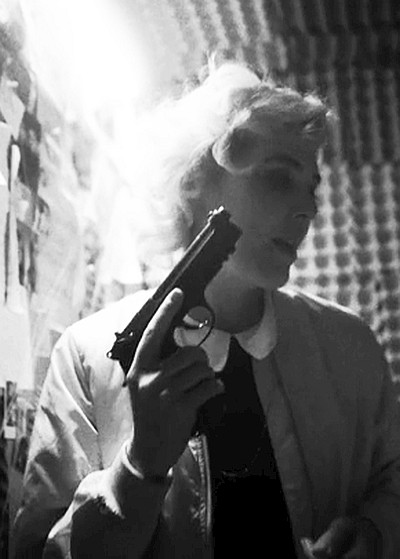★★½
“Better late than never”
 Well, that only took… twenty-one years. Back in 2003, I watched and reviewed El Jardinero 2, with the help of Chris, because it came on a Mexican DVD with no English subtitles. Imagine my surprise, therefore, when I booted up Tubi the other day, and found its predecessor streaming. No English subs – but there were Spanish ones. Nowadays, Google Translate offers a half-decent ability to convert into English, even if I ended up having to apply a lot of polish to the idiom. At least I didn’t have to bother Chris. Still, here we are, and… Well, it probably wasn’t worth all the effort, to be honest. It is another cheap slice of Mexploitation, with too much talk and not enough action, though like its successor is reasonably entertaining.
Well, that only took… twenty-one years. Back in 2003, I watched and reviewed El Jardinero 2, with the help of Chris, because it came on a Mexican DVD with no English subtitles. Imagine my surprise, therefore, when I booted up Tubi the other day, and found its predecessor streaming. No English subs – but there were Spanish ones. Nowadays, Google Translate offers a half-decent ability to convert into English, even if I ended up having to apply a lot of polish to the idiom. At least I didn’t have to bother Chris. Still, here we are, and… Well, it probably wasn’t worth all the effort, to be honest. It is another cheap slice of Mexploitation, with too much talk and not enough action, though like its successor is reasonably entertaining.
It turns out I misspoke in the sequel, when I described Pablo Moreno (L. Reynoso) as the husband of Lilia Gallardo (Herrera). It’s a bit more complex. Lilia returns from abroad to her home town in rural Mexico to discover her father has been murdered by drug dealers. Worse, her mother has taken up with the head of the clan, Adan Moreno. Lilia is unimpressed, and in the resulting fracas, shoots Moreno dead before fleeing. The family kinda blames their rivals, and Mom goes to her grave rather than implicate her daughter, despite brutal treatment at the hands of the gang’s enforcer, Mario Argumedo (Pineda). Dismissing the concern of her godfather, Lilia decides to infiltrate the family, do as much damage as possible and take her revenge.
Vengeance is a long time coming, shall we say. She has to befriend Pablo, posing as an out-of-towner (I guess she must have been abroad for a long time, since he doesn’t recognize her), and using her womanly charms to get an invite to stay on the ranch. She then uses this access to figure out where their poppy fields are located, and recruits her godfather to set them on fire one night. There’s also dissent in the ranks between Pablo and his brother Gabino (H. Reynoso – no clue if the actor is related to his on-screen brother), with the latter unhappy about the influence Lilia is having on his sibling. It doesn’t stop Pablo from inviting her to help out in the family business.
And this is how we eventually get back to where we came in for the sequel, with a gun-battle between the two sides, roughly eighty minutes after the first time we see Lilia shoot Adan. It feels more like a feature-length telenovela, with all that implies. I’d be hard-pushed to call this good, yet it did manage to keep my interest, with things like how the small country towns is basically run by the Moreno cartel, with the police chief utterly in their pocket. None of the locals seem bothered. It’s certainly a bit different, though much as with the sequel, I wish Lilia had been as much of a bad-ass as the cover again implies.
Dir: Enrique Murillo
Star: Lorena Herrera, Salvador Pineda, Luis Reynoso, Héctor Reynoso





 In one of the odder remakes I’ve seen in a while, this is a repurposing of the French 2013 film, Les reines du ring, which translates as “Queens of the Ring”. The core concept is retained, but the location is changed from France to Mexico, and the idea is expanded to a ten-part series. These changes make for a bit of a mixed blessing. Pro wrestling is certainly a more well-established part of the cultural landscape in Mexico, where lucha libre is extremely popular. On the other hand, the multiplication of the running time a factor of about four, leads to the necessary injection of superfluous storylines, which definitely reduced the entertainment value as far as I was concerned. It’s less a wrestling soap-opera, than a soap-opera with wrestling in it.
In one of the odder remakes I’ve seen in a while, this is a repurposing of the French 2013 film, Les reines du ring, which translates as “Queens of the Ring”. The core concept is retained, but the location is changed from France to Mexico, and the idea is expanded to a ten-part series. These changes make for a bit of a mixed blessing. Pro wrestling is certainly a more well-established part of the cultural landscape in Mexico, where lucha libre is extremely popular. On the other hand, the multiplication of the running time a factor of about four, leads to the necessary injection of superfluous storylines, which definitely reduced the entertainment value as far as I was concerned. It’s less a wrestling soap-opera, than a soap-opera with wrestling in it. ★★★
★★★ There are quite a lot of familiar faces for this one. There’s the long-running relationship between Teresa and Russian mobster, Oleg Yosikov (Gil). This is somewhat reflected in the love triangle of her daughter, now very much her own young woman. Sofia has to decide between Oleg’s son, Fedor, and street-kid Mateo Mena. He rescues Sofia from a sticky situation, and those who want to use Sofia to force her mother into compliance with their wishes. There’s also faithful sidekick Batman, who has been with Teresa since the beginning. On the other side, as well as her ex-husband, whose power is now grown to such an extents as to be a real threat, there’s long-running DEA nemesis Ernie Palermo. He brought Teresa in, and is very keen for her to serve the rest of her eighty-five year prison sentence.
There are quite a lot of familiar faces for this one. There’s the long-running relationship between Teresa and Russian mobster, Oleg Yosikov (Gil). This is somewhat reflected in the love triangle of her daughter, now very much her own young woman. Sofia has to decide between Oleg’s son, Fedor, and street-kid Mateo Mena. He rescues Sofia from a sticky situation, and those who want to use Sofia to force her mother into compliance with their wishes. There’s also faithful sidekick Batman, who has been with Teresa since the beginning. On the other side, as well as her ex-husband, whose power is now grown to such an extents as to be a real threat, there’s long-running DEA nemesis Ernie Palermo. He brought Teresa in, and is very keen for her to serve the rest of her eighty-five year prison sentence.

 I did not originally expect to be reviewing this here. I watched it because of the technical elements, which I’ll get to in a bit. However, by the end, it does qualify – though you certainly wouldn’t think so from how things begin. It gets underway with Lili (Puig) waiting for a date arranged over the Internet with Eduardo (Alcantara). He shows up late, very apologetic after having been mugged, and having had his phone taken, but is utterly charming, and the chemistry with Lili is immediate. They end up back at his place for dinner. But as he’s cooking on the kitchen, the tone of the evening changes, when she hears his supposedly stolen phone going off in his jacket…
I did not originally expect to be reviewing this here. I watched it because of the technical elements, which I’ll get to in a bit. However, by the end, it does qualify – though you certainly wouldn’t think so from how things begin. It gets underway with Lili (Puig) waiting for a date arranged over the Internet with Eduardo (Alcantara). He shows up late, very apologetic after having been mugged, and having had his phone taken, but is utterly charming, and the chemistry with Lili is immediate. They end up back at his place for dinner. But as he’s cooking on the kitchen, the tone of the evening changes, when she hears his supposedly stolen phone going off in his jacket… A long time ago – 17 years or thereabouts! – we reviewed another Chagoyan/Fernandez production,
A long time ago – 17 years or thereabouts! – we reviewed another Chagoyan/Fernandez production,  Halfway through the final installment, Chris came in. She paused, watching for a moment, then said, “They spend far too much time talking, and not enough time killing.” Just a shame she waited 93 episodes to express so succinctly one of the main problems with the series. For, even if the final arc had its share of bloodshed, if you average it out per show, it’s about the level of a mid-strength nosebleed. It certainly put the novela into narconovela. Though the problems began at the start – or, rather, the end of the second series where heroine Sara Aguilar was apparently gunned down. This being a show where escape from death was common, I spent the first 20 episodes waiting for her to return. Spoiler: she doesn’t.
Halfway through the final installment, Chris came in. She paused, watching for a moment, then said, “They spend far too much time talking, and not enough time killing.” Just a shame she waited 93 episodes to express so succinctly one of the main problems with the series. For, even if the final arc had its share of bloodshed, if you average it out per show, it’s about the level of a mid-strength nosebleed. It certainly put the novela into narconovela. Though the problems began at the start – or, rather, the end of the second series where heroine Sara Aguilar was apparently gunned down. This being a show where escape from death was common, I spent the first 20 episodes waiting for her to return. Spoiler: she doesn’t. Nine years after the events of the
Nine years after the events of the  A sold enough entry, this benefits from a well-written script, but gets marks taken off for having a heroine who is rather too passive. Yolanda Acosta (Paleta) is sent to a higher security facility when she is recaptured, following an escape from her previous prison. It’s a mixed-gender facility (common in Mexico), and she comes to the attention of Benedictino Suárez (Zurita), a.k.a. “Centaur”, a local crime boss who is also incarcerated. He falls hard for Yolanda – the title translates as “Centaur’s Woman” – and when his escape plan comes to fruition, offers to bring her along with him, to the ranch on which he’s hiding out. And that’s where the problems really start for Yolanda.
A sold enough entry, this benefits from a well-written script, but gets marks taken off for having a heroine who is rather too passive. Yolanda Acosta (Paleta) is sent to a higher security facility when she is recaptured, following an escape from her previous prison. It’s a mixed-gender facility (common in Mexico), and she comes to the attention of Benedictino Suárez (Zurita), a.k.a. “Centaur”, a local crime boss who is also incarcerated. He falls hard for Yolanda – the title translates as “Centaur’s Woman” – and when his escape plan comes to fruition, offers to bring her along with him, to the ranch on which he’s hiding out. And that’s where the problems really start for Yolanda.
 ★★★
★★★ Pageants and drug cartels may not seem like topics that combine, but in South and Central America, they’re perhaps closer than you’d think. El Chapo’s third wife, Emma Coronel Aispuro, was a Mexican beauty queen. In 2013, the previous year’s winner of the “Sinaloa Woman” pageant, Maria Susana Flores, was killed in a clash with police.
Pageants and drug cartels may not seem like topics that combine, but in South and Central America, they’re perhaps closer than you’d think. El Chapo’s third wife, Emma Coronel Aispuro, was a Mexican beauty queen. In 2013, the previous year’s winner of the “Sinaloa Woman” pageant, Maria Susana Flores, was killed in a clash with police.